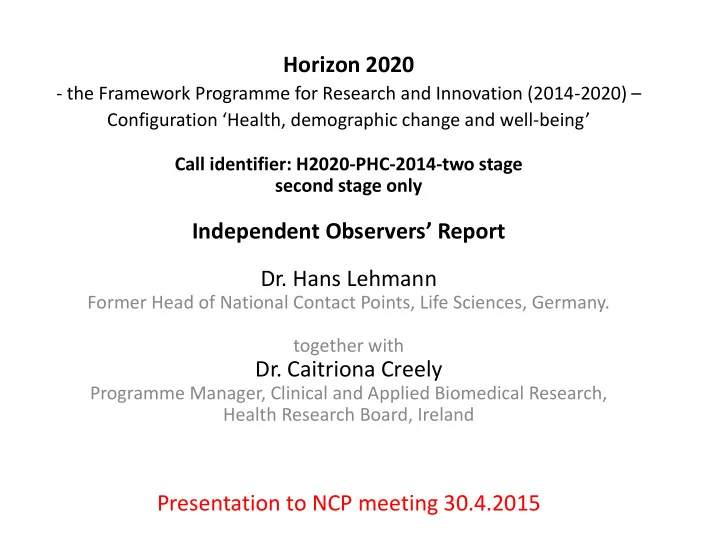

Horizon 2020 - the Framework Programme for Research and Innovation (2014-2020) – Configuration ‘Health, demographic change and well - being’ Call identifier: H2020-PHC-2014-two stage second stage only Independent Observers’ Report Dr. Hans Lehmann Former Head of National Contact Points, Life Sciences, Germany. together with Dr. Caitriona Creely Programme Manager, Clinical and Applied Biomedical Research, Health Research Board, Ireland Presentation to NCP meeting 30.4.2015
Tasks of the Independent Observers • To observe and report on the practical workings of the evaluation process, including IT tools • To observe the conduct and fairness of the evaluation sessions • To observe whether the procedures set out in the guidelines are adhered to and that the evaluation criteria are correctly used and applied • To give advice on possible improvements This is achieved by • free attendence to all meetings and free discussions with any expert or staff member of the Commission/Agency, involved in the evaluation • free access to all documents 30.4.2015 Hans Lehmann 2
Basic Remarks • The evaluation procedure applied has been developed over a number of Framework Programmes, it is well established and has been adapted to the needs of H2020 • New paradigm for the formulation of topics, in short: "broad" • A remarkable number of excellent proposals in all topics • Oversubscription at stage 1: appr. 30, at stage 2: appr. 10 • A two stage evaluation procedure with a stage 1 remote evaluation without consensus meeting, followed by a • stage 2 remote evaluation with consensus meetings • Update of evaluation criteria • No negotiation phase for successful applications 30.4.2015 Hans Lehmann 3
Stage 1 • A very strict two-stage evaluation procedure – Remote only at stage 1 with exactly 5 evaluators – selection by median and predefined absolute threshold , – no consensus meeting, no consensus report, feedback "yes" or "no" • Related to: A high number of submissions and a target of 8 months of time to grant (TTG) • No possibility of adjustment of the number of applications passing to stage 2 – no consensus meetings , a predefined threshold, in this case of 8 – for unsuccessful applications we recommend some kind of more substantial feedback, may be provided at a later stage or time 30.4.2015 Hans Lehmann 4
Oversubscription • 1681 proposals for stage 1 – oversubscription of appr. 30 • 623 passed the threshold, 616 applied for stage 2 • overall, in stage 2 the oversubscription was approximately 10 • three topics with 168, resp. 138 or 121 proposals had oversubsription rates of 17, 15 or 12 respectively in stage 2 • Recommendation: 1. Ranking the above threshold stage 1 proposals for each topic in order of score, 2. Only inviting to stage 2 a multiple of (e.g. 3 times or 4 times) the number of proposals that can be funded, to yield a success rate at stage 2 of approximately (33% or 25% respectively). If the cut-off falls within a group of proposals with the same score they should all pass to the second stage. 30.4.2015 Hans Lehmann 5
Stage 2 • 623 passed the threshold of stage 1, 616 applied for stage 2 • Slightly reformulated evaluation criteria - matching with the proposal template for H2020 – Excellence with overall concept, overall approach and methodology – Impact with clear references to the topic under the Configuration "Health" – Implementation now with the detailed workplan - "workpackages" – in particular the impact criterium was applied more intuitively, further clarifications (as often in FP7) were practically not needed • Consensus meetings in 4 of the 8 topics had to be split into subgroups, subgroups delegated evaluators into panel meetings, where the final ranking was discussed and decided • heavy workload, well organized procedures 30.4.2015 Hans Lehmann 6
Contract preparation • For successful applications a grant negotiation phase is not forseen • This was reflected in the evaluation evaluation "as is"; well communicated and respected no formulation and formal documentation of recommendations as basis of the contract negotiation • This means missing a perfect opportunity • Members of the consensus groups, selected according to expertise, are able to provide valuable feedback • Recommendation Comments should be recorded and added in the ESR form under "other" comments, or otherwise documented by the Project Officer as appropriate and communicated to the coordinator prior to the contract 30.4.2015 Hans Lehmann 7
General conclusions • The evaluation for the Call has been carried out in a just, transparent and unbiased manner. • The ranked lists of proposals recommended to the Commission for funding have been produced according to the rules and regulations stipulated by the Commission and in accordance with the guidelines for proposal evaluation and selection. Thanks The independent observers gratefully acknowledge the support by evalu- ators and Commission staff and would like to thank them for their assistance and cooperation. 30.4.2015 Hans Lehmann 8
Thank you for your attention! Dr. Hans Lehmann Former Head of National Contact Points, Life Sciences, Germany Former Member of the German Delegation to Life Sciences Programmes hans.lehmann@me.com 30.4.2015 Hans Lehmann 9
Recommend
More recommend